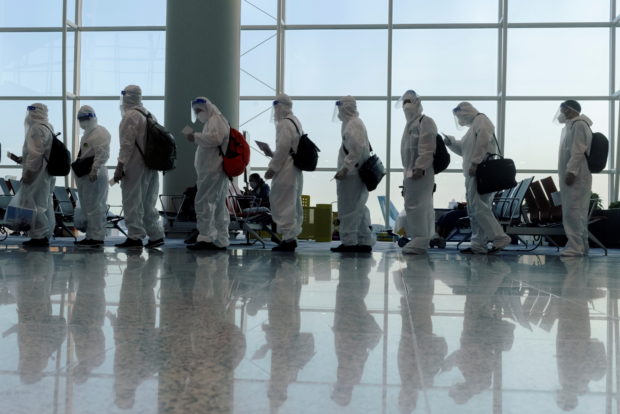Hong Kong logs 3 virus cases, detects 4th imported Omicron infection

Passengers wearing protective suits (PPE) line up to board their plane for an international flight at Hong Kong airport amid the spread of the coronavirus disease (COVID-19) on July 9, 2021. REUTERS FILE PHOTO
HONG KONG – Hong Kong reported three new imported COVID-19 cases on Wednesday as it confirmed its fourth imported Omicron variant infection, also from abroad.
In a statement, the Centre for Health Protection said the fourth Omicron case involved a man from Qatar who arrived in Hong Kong on Nov 24 for transit.
“He remained in the airside of the restricted area due to a visa-related issue and tested positive in a pre-departure test on November 27 at the restricted area in Hong Kong International Airport,” the statement reads.
The whole genome sequencing conducted by the Department of Health’s Public Health Laboratory Services Branch confirmed that the patient carried the Omicron variant, the CHP added.
It said the patient had not received any COVID-19 vaccination and showed no symptoms. He traveled from Papua New Guinea to Nigeria on November 15 and then flew from Qatar to Hong Kong.
The places where he had been at Hong Kong International Airport had been included in a compulsory testing notice on Nov 29, the CHP said.
“There are so far four cases involving Omicron in Hong Kong. Two cases are related to South Africa and two cases are related to Nigeria,” the CHP said.
It also said the three new imported cases on Wednesday involved three women from Pakistan, Spain, and the Philippines. The patient from Spain had the L452R variant.
The woman from Pakistan was a close contact of six other patients from abroad and she tested positive at the Penny’s Bay Quarantine Centre.
“For the remaining patients, one of them tested positive during the “test-and-hold” arrangement upon arrival at the Temporary Specimen Collection Centre at Hong Kong International Airport and the other one tested positive during quarantine,” the CHP said.
It added that 48 cases were reported from Nov 17 to 30 and all of them were imported. The city’s tally stood at 12,439.
In a separate statement, the government instructed testing service provider BGI to review its system after it sent SMS notifications on Nov 28 to 216 persons, informing them again of the negative results of their COVID-19 tests conducted in March.
“It is understood that staff of the testing service provider concerned, BGI, had wrongly uploaded old negative results to the (Department of Health’s) relevant information system on Nov 28. This had led to SMS messages being automatically sent under the existing setting to the persons involved,” the statement reads.
“In accordance with advice from the DH, BGI has informed the affected persons about the incident with apologies via SMS messages,” it added.
The government said it instructed BGI to review its current workflow of data entry and result uploading to prevent similar incidents from occurring.
For more news about the novel coronavirus click here.
What you need to know about Coronavirus.
For more information on COVID-19, call the DOH Hotline: (02) 86517800 local 1149/1150.
The Inquirer Foundation supports our healthcare frontliners and is still accepting cash donations to be deposited at Banco de Oro (BDO) current account #007960018860 or donate through PayMaya using this link.